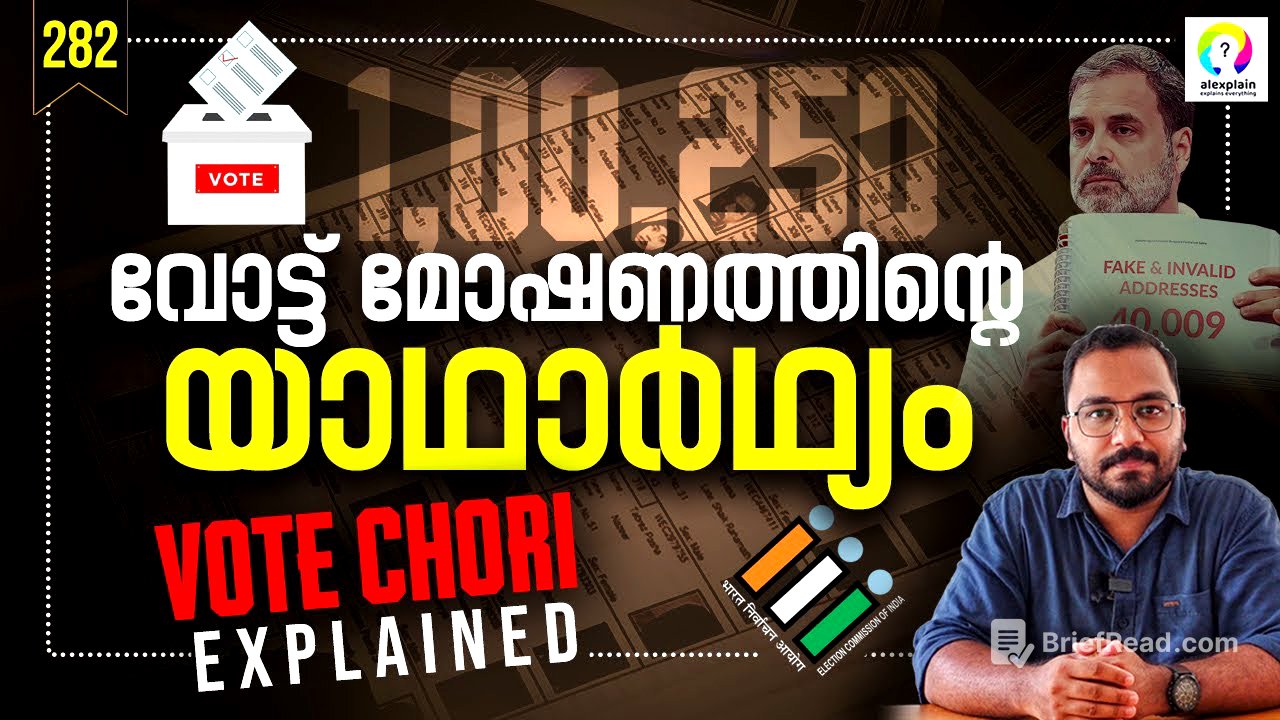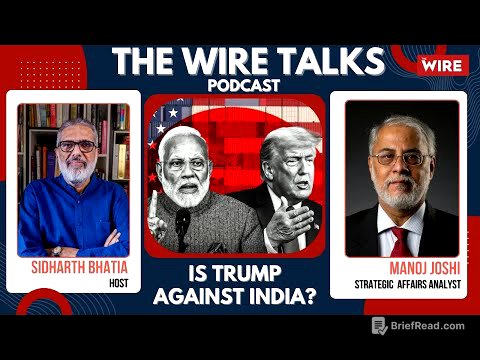TLDR;
This video discusses the controversy surrounding the accuracy of India's electoral rolls, focusing on allegations made by Rahul Gandhi regarding irregularities in the voter list of the Mahadevapura Assembly Constituency in Karnataka. It also covers the Election Commission of India's response to these allegations, including their justification for not providing digital copies of the electoral rolls and their stance on the timing of the accusations.
- Rahul Gandhi alleges significant irregularities in the Mahadevapura Assembly Constituency's electoral rolls, including duplicate voters, fake addresses, and misuse of Form 6.
- The Election Commission of India defends its processes, citing privacy concerns and a Supreme Court judgment to justify not providing digital electoral rolls.
- The video presents both sides of the argument, highlighting the questions raised by those who find the Election Commission's responses unsatisfactory.
Introduction: India's Electoral Process and Recent Allegations [0:00]
The Election Commission of India is responsible for ensuring free and fair elections, maintaining accurate voter lists, and resolving election-related disputes. Recently, Rahul Gandhi, the Leader of Opposition in the Lok Sabha, raised concerns about the accuracy of the electoral roll, prompting a response from the Election Commission. This video aims to explain the allegations, the Election Commission's response, and the broader context of maintaining accurate electoral rolls in India.
Maintaining Accurate Electoral Rolls in India [2:00]
Electoral rolls in India are continuously updated to include new voters, remove deceased individuals, and reflect changes in residency. This revision process is overseen by Electoral Registration Officers (EROs) at the constituency level, often sub-collectors, who are assisted by Booth Level Officers (BLOs). BLOs conduct inquiries and accurately add or remove names from the voter list. Political party activists, known as Booth Level Agencies (BLAs), also participate to ensure accuracy. After the revision, the Election Commission releases a draft list, allowing voters and parties to submit claims and objections. A final list is released after resolving these issues, with a two-tier appeal system available for later disputes, involving the District Collector and the Chief Electoral Officer of each state.
Rahul Gandhi's Allegations Regarding the Electoral List in Karnataka [4:26]
Rahul Gandhi is questioning the integrity of the electoral list in the Mahadevapura Assembly Constituency in Karnataka, which falls under the Bangalore Central Lok Sabha constituency. This area was chosen because in the 2024 Lok Sabha elections, the BJP candidate won with a significant majority due to a large margin in Mahadevapura. The voter count in Mahadevapura has increased by 140% since 2008, compared to a 12-26% increase in nearby areas, raising suspicions. When requesting the electoral roll, the Election Commission provided a paper copy in a non-machine-readable format, hindering efficient analysis. Gandhi alleges finding 150,000 manipulated entries, citing five types of irregularities.
Specific Irregularities Alleged by Rahul Gandhi [7:47]
Rahul Gandhi's allegations include five main points: duplicate voters (approximately 11,965 entries), fake addresses (409 instances with house numbers listed as zero or unverifiable), bulk voters (452 cases where many names are registered at one address), irregularities in photos (4,132 instances of missing or unclear photos), and misuse of Form 6 (33,692 cases of repeated use with different information). These irregularities suggest approximately 125,000 fake entries in the Mahadevapura Assembly Constituency's electoral rolls. Gandhi also references the Maharashtra elections, questioning the high percentage of voting after 5:30 pm and the Election Commission's decision to reduce CCTV footage storage to 45 days.
Election Commission's Initial Response and Anurag Thakur's Allegations [11:58]
While Rahul Gandhi alleges the Election Commission is favoring the ruling party, BJP leader Anurag Thakur makes similar claims about manipulations in the Wayanad constituency, won by Congress. Initially, the Election Commission responded to Gandhi's allegations with technical points, requiring an affidavit and complaint under oath for investigation, which Gandhi rejected. Later, the Election Commission held a press conference to address the allegations.
Election Commission's Official Response to the Allegations [13:13]
The Election Commission defended its decision to store CCTV footage for only 45 days, citing privacy concerns. They argue that Rahul Gandhi's public display of names and pictures during accusations is a misuse of privacy. The Election Commission questions why the Congress Party did not pursue legal action within the 45-day window after the election results. Regarding fake addresses, they explain that house number zero is assigned to homeless individuals or those without a formal address. They acknowledge multiple entries but state there is no evidence of people voting in multiple places. The Election Commission also highlights the extensive involvement of government servants and political party agents in the election process, questioning the possibility of widespread fraudulent voting.
Election Commission's Stance on Digital Electoral Rolls and Final Demands [16:19]
The Election Commission states that providing electoral rolls in machine-readable format is prohibited due to a 2019 Supreme Court judgment and concerns about potential manipulation. They are not conducting an investigation unless Rahul Gandhi submits an affidavit under oath and demands a public apology for misleading allegations.
Reactions to the Election Commission's Response and Counter-Arguments [17:17]
Reactions to the Election Commission's response are divided. Some believe the Election Commission addressed the issues accurately, while others find the answers unsatisfactory, particularly regarding entries without photos and the misuse of Form 6. Critics argue that the Election Commission is deflecting responsibility onto political parties for not identifying problems during voter list updates. They also question the validity of dismissing allegations based on the availability of a 45-day window for Supreme Court appeals and highlight the time-consuming nature of analyzing paper-format electoral rolls. The Supreme Court verdict of 2019 did not ban machine-readable format. Critics also question why the Election Commission does not take the same stand against leaders from the ruling party when similar allegations are made.









